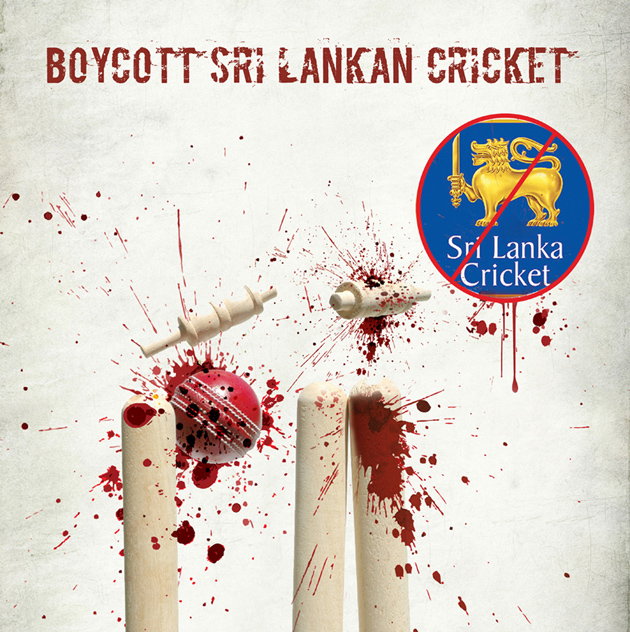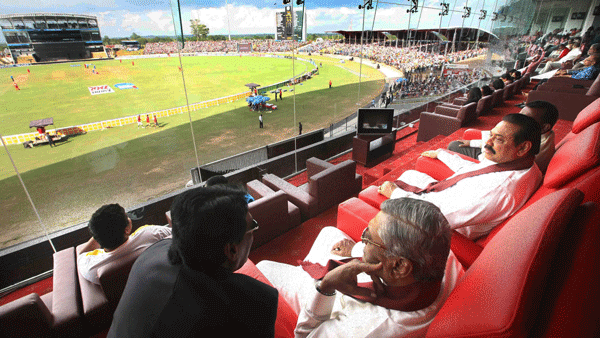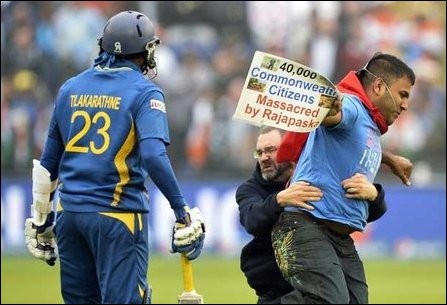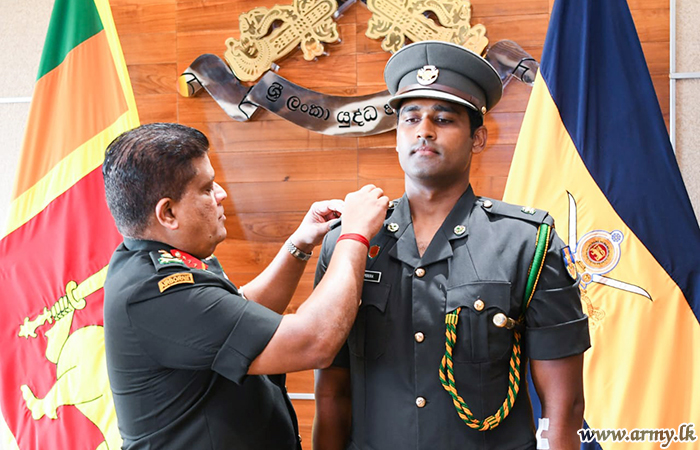
England’s cricket team confirmed it will be embarking on a tour to Sri Lanka next month, where members will be spending five days at the Mahinda Rajapaksa International Cricket Stadium, amidst fears over deteriorating human rights on the island and growing calls from anti-racism campaigners for a sporting boycott.
The team will arrive in Sri Lanka on January 2 where they will be quarantined for just 3 days whilst they are tested for coronavirus, bypassing current military enforced regulations stipulating that all arrivals must be subject to a 14-day mandatory quarantine.
From January 5 onwards, the players will be allowed to train at the Mahinda Rajapaksa International Cricket Stadium. The stadium, named after Sri Lanka’s war crimes accused prime minister, is currently being managed by Brigadier Shanaka Ratnayake, the commander of the Sri Lankan Army Commando Regiment. England will then play two Test matches behind closed doors at Galle.

Rajapaksa in 2011 watching a cricket match at the stadium.
The tour comes as Mahinda Rajapaksa’s brother, Gotabaya Rajapaksa, marked his one year in office as president last month - a period that has seen increased arrests of Tamils in the North-East, the jailing of government critics and a state crackdown in media freedom across the island.
British Tamil activists voiced their concern over the tour and pressed for the England players to take a principled and boycott the series.
“This regime oversaw the slaughter of tens of thousands and is the most outwardly chauvinistic in decades,” said Selva, an activist who has worked on the 'Boycott Sri Lanka' campaigns.
“The English cricket team touring and training at the Mahinda Rajapaksa International Cricket Stadium will be seen as an endorsement of his racist and supremacist politics. In an era where athletes across the globe are taking principled stands against racism, we urge the England team and players to do the same.”
The English cricket team has previously undertaken historic sporting boycotts, refusing to tour Apartheid South Africa in the 1970s and boycotting Zimbabwe in 2008. Campaigners are now urging England to do the same with Sri Lanka.
The call has a history going back decades, when Tamil activists in the 1970s and 80s would protests outside stadiums and stage pitch invasions as Sri Lanka played in England, as part of long-standing campaigns for justice and accountability.
The end of the armed conflict in 2009, where the government led by Rajapaksas oversaw the shelling of hospitals and execution of surrendering Tamils, saw the demands reinvigorated and gaining international attention.
In 2011, sportswriter of the year and former England cricket captain Mike Atherton wrote in The Times that the “Tamils’ plight must prick English consciences”.
“The United Nations’ inaction on the evidence of war crimes looks inexcusable,” he added. “If that continues, it is likely that questions will be asked about the suitability of England’s tour to Sri Lanka, scheduled for this winter. After all, there seems little to differentiate President Rajapaksa’s brutal regime from that of Robert Mugabe’s in Zimbabwe, about whom English consciences were severely pricked.”
“Only a fool thinks that sport and politics do not mix," wrote Andy Bull, sports writer with The Guardian. "England’s cricketers will be expected to play against a man who is a direct representative of a government accused of war crimes on a horrific scale by the United Nations. The politics of the matter is not outside the ground or behind a metal fence any more. It is right there in the middle of the pitch and it cannot be ignored.”

Australian protestors in 2013 call for a boycott of Sri Lanka.
At the time England’s tour to Sri Lanka went ahead, but it raised high profile questions on the role the sport in whitewashing the regime. “The English cricketing authorities plumped to resume ‘business as usual’ in a country which is facing international excoriation in the light of a growing mountain of evidence pointing to horrific war crimes,” wrote Jon Snow, a veteran British broadcaster in 2012. “Amid the sweat, the heat, and the romance of this colonial ground, cricket has ensured that a whole world of sport is absorbed in a game, whilst the fate of up to 40,000 civilians (UN expert panel estimate) slaughtered on fields on the very same island lie unaddressed and largely unmentioned.”
“Should England’s cricket team tour Sri Lanka?,” wrote Channel 4 News Foreign Editor Ben De Pear, as a copy of the documentary ‘Sri Lanka’s Killing Fields; War Crimes Unpunished’ was handed to the then manager of England’s team.
Atherton would write again on Sri Lanka, stating that with the call up of Sanath Jayasuriya, who was then a parliamentarian in Rajapaksa’s party “the alignment of cricketing and political interests in Sri Lanka is laid bare”.

A British Tamil protestor holds a placard as he disrupts play in Cardiff, 2013.
In the years since, the resurgence of the Rajapaksa regime has only exposed and consolidated those links further. In addition to the management of the Hambantota stadium being taken over by the military, Sri Lanka's Sports Minister is Namal Rajapaksa, the son of the elder prime minister Mahinda. Sri Lanka's National Sports Selection Committee is also headed by Army Commander Lt. Gen. Shavendra Silva who is currently banned from travel to the United States over his role in overseeing the execution of Tamils. And earlier this year, the Sri Lankan army announced that two of the country’s “internationally-famed professional cricketers” have been commissioned as majors in the military, as Silva pinned rank insignia on them.

The military, which is playing an increasingly prominent role in civilian life across the island, has tens of thousands of soldiers deployed across the North-East. England’s cricketers, however, will be confined to playing in the south of the island.
"For decades Sri Lanka has used sport to project normality within its shores and whitewash mass atrocity crimes it has and continues to commit against the Tamil people,” said the Tamil Youth Organisation UK in a letter to the England and Wales Cricket Board on Monday. “This tour will only aid Sri Lanka to falsely project normalisation instead of achieving it through tangible efforts towards accountability and justice.”
“The England and Wales Cricket team and the Board have a moral duty to use their position in the cricketing world to send a clear and loud message to human rights violators in Sri Lanka and other parts of the world, and stand firm against war crimes, crimes against humanity and genocide.”
